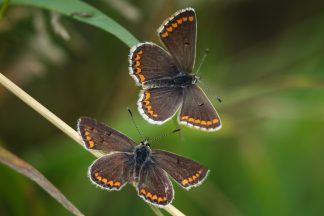Scotland’s Caledonian pinewoods are on a “knife-edge” and face the threat of being the last generation in a line stretching back to the last ice age, an environmental charity has warned.
In the first study in more than 60 years examining the health of the trees, Scotland’s national tree, the Scots pine, was found to be in serious decline at a quarter of the more than 1,200 half-acre plots analysed.
High deer numbers, spread of non-native conifers, lack of long-term management, and emerging impacts of climate breakdown are major threats to the pinewoods’ survival, the four-year study carried out by rewilding charity Trees for Life found.
Urgent action needs to include dedicated and easily accessible long-term funding, so private landowners can save and restore their pinewoods and look after them in the future, the charity said.
It is also calling for full implementation of proposed national measures to reduce deer numbers, as well as action to allow the pinewoods to expand into cooler areas such as higher up mountains to tackle to climate change.
Steve Micklewright, Trees for Life’s chief executive, said: “Our findings are an alarm bell for Scotland’s Caledonian pinewoods, which are such an important part of the country’s culture and environment.
“The majority of the surviving fragments are now on a knife-edge, and bold action is needed to save them from being lost forever.
“A landscape-scale approach backed by the Scottish Government is urgently needed to save, expand and connect up these precious woodlands before it is too late.”
The Caledonian forest once covered much of the Highlands, but after centuries of deforestation only 2% remains.
James Rainey, Trees for Life’s senior ecologist, who led the study, added: “In the worst cases, the pinewoods have suffered non-native conifer planting or fire followed by grazing pressure, with the impacts of climate breakdown a growing threat.
“These pinewoods should be playing a key role in Scotland’s fight-back against the climate and nature emergencies, but right now most are on their last legs.
“It’s not too late to turn this around, but that means seriously stepping-up restoration and rewilding action.”
The study’s findings will be used by Trees for Life to develop a follow-up project with landowners and land managers for practical action to protect, expand and reconnect the most threatened pinewoods.
Follow STV News on WhatsApp
Scan the QR code on your mobile device for all the latest news from around the country




























